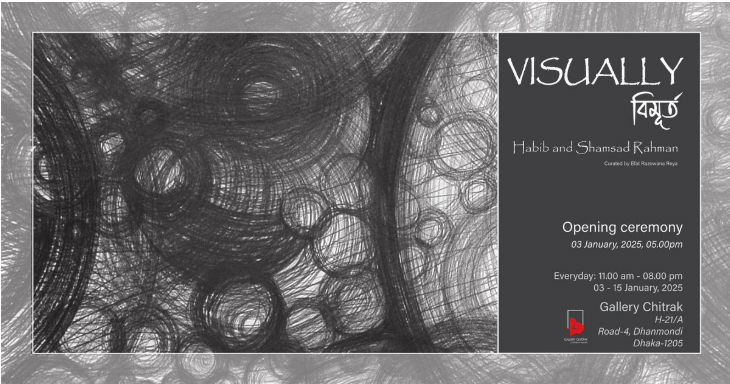‘July Revolution on Posters’: A fusion of art and technology at Shilpakala

Yesterday, the Arts and Production Department of Bangladesh Shilpakala Academy launched a live and interactive AR-VR (Augmented-Virtual Reality) exhibition titled "July Revolution on Posters", featuring Debashish Chakrabarty's artworks on the July Uprising. The inauguration ceremony was held at 4:00pm in the Jatiya Chitrashala Auditorium.
The Adviser to the Ministry of Law, Justice, and Parliamentary Affairs and the Ministry of Expatriate Welfare and Foreign Employment, Dr Asif Nazrul, graced the event as the chief guest. The programme was chaired by Dr Syed Jamil Ahmed, the director general of Bangladesh Shilpakala Academy.

The event featured prominent individuals including photographer, curator, and activist Dr Shahidul Alam; writer, journalist, and BSS Chief Editor Mahbub Morshed; and director of the Fine Arts Department at Bangladesh Shilpakala Academy, Mustafa Zaman.
Joining live from Amsterdam was writer and researcher Parvez Alam, while artist Debashish Chakrabarty participated live from the United States. Abdul Halim Chanchal, director of the Production Department at Bangladesh Shilpakala Academy, delivered the welcome address for the occasion.

In his address as the chief guest, Adviser Asif Nazrul remarked, "In the last 15 years, during a fascist regime, we have observed the deceptive strategies used to create alternative narratives. Numerous claims have been made regarding developmental progress. However, a mere poster proved to be a powerful instrument in crafting new narratives. Posters played a crucial role in propelling the July movement."
Reflecting on the art graffiti surrounding the July Movement, the adviser stated, "Over the past 15 years of fascist ruling, we never witnessed graffiti being used as a powerful medium in the political landscape. While graffiti may not remain forever, published records of them can preserve their essence. From this perspective, the initiative by Bangladesh Shilpakala Academy is commendable."

In his presidential address, DG Syed Jamil Ahmed, stated, "Artist Debashis Chakraborty has admirably demonstrated how art can simultaneously serve as a political instrument and a work of creative expression. There is no ambiguity in this achievement. He has vividly illustrated the essence of artistic work. I extend my heartfelt congratulations to the artist for standing firmly with his creations amid the then ongoing mass movement."
"The younger generation has much to learn from the artist. What defines aesthetics—what constitutes beauty? You (Debashis) have deconstructed this concept and conveyed it through colours and lines with remarkable clarity. Your work has not only stirred emotions but also inspired individuals to align themselves with the movement. Rather than creating art for mass appeal, you crafted art that is inherently political yet remains unequivocally artistic," he further added.

The director general stated that the Academy's Production Department plans to widely promote such artistic works using AR-VR technology. He emphasised that this aligns with Shilpakala's mission and announced plans to introduce similar initiatives in the future.
Students, artists, intellectuals, and professionals were instrumental in the Anti-discrimination Students Movement and the July Uprising, using social media as a key tool for activism. Like the iconic posters of the 1971 Liberation War, the cartoons and posters from the uprising have become historical symbols.

Notably, Debashish Chakrabarty's work has sparked socio-political dialogue through social media, with his impactful posters marking a milestone in Bangladeshi art history.
Recognising the significance of Bangladeshi art and the mass uprising, a live and AR-VR exhibition has thus been organised featuring 20 posters selected from the hundreds created by Debashish during the July uprising. These posters will be permanently housed in the VR gallery of Bangladesh Shilpakala Academy, with plans for VR exhibitions to be held in various districts under the guidance of the Production Department.

Through AR-VR, different perspectives and contexts of the artist's posters will be showcased. Using the VR controller, the audience will interactively explore the context and meaning of each specific poster, along with various structures, documentaries, audio, and video content related to the artwork.
The exhibition will be held daily from 11am to 8pm, running from January 7 to 19 at Gallery 5 in the Jatiya Chitrashala Auditorium.



 For all latest news, follow The Daily Star's Google News channel.
For all latest news, follow The Daily Star's Google News channel. 
Comments